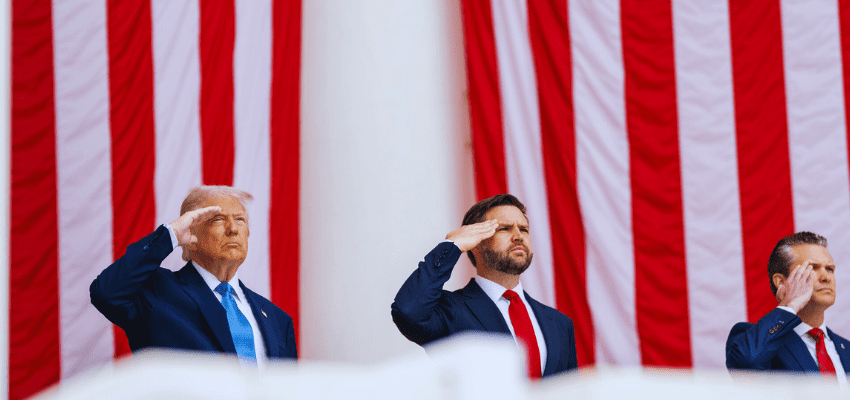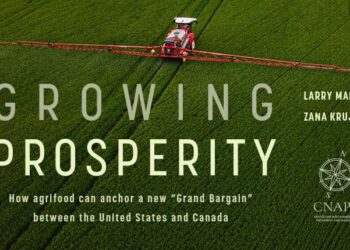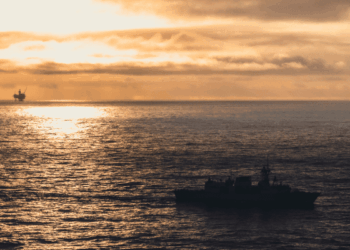This article originally appeared in 19FortyFive.
By Matthew Bondy, June 4, 2025
When former President Barack Obama took office, he embarked on a global apology tour.
In Cairo, in 2009, he apologized for the Global War on Terror, which he would go on to lose by letting the Islamic State in Iraq—which he laughed off as a “JV” terror squad—overcome the country he abandoned as Commander in Chief.
He apologized for “dictating our terms” to Cuba for decades following the Missile Crisis, as if projecting kindness toward an adversary that threatened the American homeland with nuclear annihilation would make it less hostile.
His penchant for bowing to foreign leaders reflected his discomfort with American power as he sought to bridge diplomatic divides.
This apology tour was born of hubris, the notion that one man’s charm, interpersonal skills, and personal understanding of various foreign policy issues could alleviate deep-seated geostrategic tensions.
Donald Trump vs the World
It’s a mistake that President Donald Trump is repeating in real-time. While his method is more blunt force trauma than contrition, Trump’s own exaggeration of his personal abilities to solve international problems is no-less misplaced.
Elected in part on a commitment to end the war in Ukraine on day one, Trump believed that the conflict was rooted in large part in then-President Joe Biden’s lack of personal diplomatic talents. With Biden out and Trump in, success would be inevitable.
Except that’s not turning out to be the case.
Trump is starting to lose his temper with both Ukrainian President Volodymyr Zelenskyy and Russian President Vladimir Putin. His administration has resorted to essentially extorting the former for deeply needed military assistance in return for access to Ukrainian critical mineral resources and sharing that he’s “pissed off” with Putin for dragging his heels on a peace deal.
The hubris exhibited by both Obama and Trump—and their lack of appreciation for what “realists” would refer to as objective, competing national interests—is not only a lesson for future American leaders, but it also presents a significant opportunity for the free world, including Canada.
Trump’s well-documented “bromance” with the Kremlin’s top thug, Putin, seems to be winding down, and with it, the potentially horrific scenario of closer U.S.-Russian geopolitical alignment that seemed possible, or even likely, when Trump returned to the White House.
Canada and its democratic allies should use this opportunity to artfully, diplomatically, and earnestly convey a vital message to Trump: Russia’s quiet refusal to do Washington’s geopolitical bidding speaks to the value, wisdom, and natural staying power of NATO and the Atlantic community of democratic partners. Not only that, but Canada and her allies should build on newly elected Canadian Prime Minister Mark Carney’s charm-and-policy offensive—especially the moment when he claimed Trump had “revitalized” NATO as president—to build enhanced trade and security links. This is a moment for establishing solid partnerships across both vectors as NATO modernizes and Canada heads into CUSMA renegotiations in 2026.
Two areas where Canada specifically should focus include critical minerals and the Arctic.
President Trump has been seeking critical minerals deals worldwide to secure America’s high-tech and defense supply chains. Canada has them in abundance. The US relies on Canada for between 50% and 80% of its critical mineral needs, including 80% of the nickel used in the US aerospace sector.
And it’s not just the raw critical minerals but the ability to extract and refine them. Unlike in the oil industry, where Canada extracts but doesn’t refine, America’s northern neighbor is in a much stronger position on mining and critical minerals. For example, Canada has three fully online nickel refineries across the country. The United States has none. That’s despite the fact—as summarised by the Center for Strategic and International Studies—that mining and mineral processing are “crucial in maintaining the military’s technology edge, securing manufacturing supply chains, and pursuing sustainable development practices.”
This is exactly what free trade and international partnerships are for. Not everything can, or should, be made in one country. This fact of “comparative advantage” is literally why Adam Smith wrote The Wealth of Nations. Canada should propose a bold new critical minerals development and processing partnership with the United States under the auspices of NATO to “securitize” this sector amid rising competition from aggressive, revisionist dictatorships like China and Russia and to attempt to “tariff-proof” as much of the critical mineral and mining industry as possible. This could be a profoundly beneficial economic and military partnership.
In the Arctic, Canada is finally addressing the situation with seriousness.
In 2022, under then-defence minister Anita Anand (now the newly appointed foreign minister in Carney’s cabinet), Canada committed $5 billion to an over-the-horizon polar radar system. This was to replace its legacy predecessor, the North Warning System, which had, in turn, stemmed from the original Dew Line built in the 1950s.
That’s a good step, and Canada has also committed—at least through research initiatives—to partnering with America on ballistic missile defense capabilities—which have deep strategic applications for the Canadian High North.
The Institute for Peace and Diplomacy persuasively makes a case for Canada to redouble our Arctic efforts because—unlike most security-related arenas where those of the United States dwarf the dominion’s capacities—this isn’t true of Coast Guard Arctic icebreaking.
“If Canada was a leader in a subset of relevant capacities,” they argue, “including Arctic science, icebreaking, surveillance and detection, and food security in the North,” the nation would have significant leverage and opportunity to couple into US strategic capabilities, providing leverage and equal partnership in an area of critical and growing interests for both countries.
And this is the broader point. While Trump may have a penchant for the strongman persona of autocrats around the world, the United States remains a democracy and the leader of the world’s democracies in a way that is deeply institutionalized by law, practice, culture, and values.
As the 47th president faces disappointment about the potential for allyship or even rapprochement with the Russian Federation, and as he comes to terms with the limits of his ability to achieve ambitious geopolitical outcomes based on his talents, this is the moment to reinforce why NATO and its members have stuck together so long, and so successfully: because it’s a partnership that makes sense.
Matthew J. Bondy is a senior fellow with the Macdonald-Laurier Institute and the Centre for North American Prosperity and Security.








